- Home
- Julie Smith
P.I. On A Hot Tin Roof Page 12
P.I. On A Hot Tin Roof Read online
Page 12
Boudreaux was a pretty common name, so she didn’t go through the usual backgrounding process. If this was the guy who planted the drugs, he was probably a cop. She called the police department and asked for Mac Boudreaux. She was immediately put through.
Smiling, she hung up.
This was it. With luck she’d be at the house when the transaction occurred.
She absolutely couldn’t wait to tell Eddie.
***
Eddie was half thinking of going home—nobody was in any kind of mood for business on Lundi Gras—but now he had to do Ms. Wallis’s work as well as his own. He was in his office wrestling the damn machine when she careened in, bouncing off the walls.
“Eddie, we got him. I heard him on the speakerphone—promising to pay the guys who did it.”
He looked at her over the top of his glasses. “They said they did it? On the phone?”
“Well, not in those words.” She reported what the guy had said, and her subsequent confirmation that he was a cop. “With any luck, I can photograph Buddy paying them off. With my trusty spy phone.”
“Ya ridin’ for a fall, Ms. Wallis. They catch ya, no tellin’ what they might do.”
“Hey! Who’s the baroness? Catching me’s not in the cards.”
She was way too cocky for her own good. If it wasn’t Angie’s reputation at stake, he’d order her not to do it. But he wasn’t about to—because she was right. They probably had enough already to bring Buddy down—and get the charges dropped against Angie. Maybe not by going through the usual channels, but Eddie had friends in the police department; he wondered about Boudreaux’s reputation. He could find out by asking around, but he said to Ms. Wallis, “Ya find anything on Boudreaux? He ever been in trouble?”
“Yep.” She was grinning. “Suspended two years ago. For failing to book valuable evidence—sometimes drugs, once a wallet with a lot of money in it; also ‘borrowing’ from the property room. He busted an armed robber, the guy had Rolex watches, Boudreaux turned up wearing one.”
Eddie thought about it. It was almost too seamless. He really didn’t see how she could have been so lucky with the speakerphone. “Ms. Wallis, ya know about the fruit of the poisoned tree?”
“Sure. Tainted evidence.” She shrugged. “But this isn’t evidence. It’s journalism.”
“It’s still poisoned.”
“What are you getting at, Eddie?”
“Ya know about going to jail if ya been doin’ anything ya shouldn’t, right?”
“EdDEE! You mean illegal listening devices? You know I wouldn’t do a thing like that. Besides. I wouldn’t even know how.”
In a pig’s eye, she wouldn’t. She was an electronics expert. Well, it was her ass if she’d done it: the worst that could happen to Eddie was a lawsuit that would ruin him. But then again, if she did get photos of a judge with a dirty cop, who was going to sue? The P.I. board could still fine him, but what was a few grand to get Angie out of this mess?
Inwardly, he squirmed a little, but there wasn’t a damn thing he could do about Ms. Wallis’s methods except fire her. He’d eaten the fruit of the poisoned tree himself a time or two, when he was a Jefferson Parish deputy.
He narrowed his eyes at her, anyhow. “Just be sure ya never learn.”
“Let’s get Angie over here. And Jane Storey.”
And so they powwowed, the four of them, and that tightass Jane Storey nearly wet her pants. “We are going to cook him, baroness. This is enough for a whole series.”
“Maybe a Pulitzer in it for ya,” Eddie said.
“Lot of legwork to do, though. Talba, you really think you can get Buddy paying them off?”
She shrugged. “Depends if I’m there when Mac shows up. If I am, I’ll get it.”
Eddie had no doubt she would. She had that little phone camera, and a beeper camera as well. She’d get something. But she couldn’t record audio. He reminded her of that.
“EdDEE!” she said again. “Think I’m crazy?”
“I’ll take that, as Buddy would say, under judicial review. Look, tell ya what. I’ll surveil the house; I can get them going in if they show up—with my new little toy.” Ms. Wallis had made him buy a state-of-the-art digital camcorder, one you could almost hide in the palm of your hand.
“Great idea!” Jane Storey cried. “Why don’t you let me go with you? I can see it for myself.”
What the hell had he gotten himself into? “No, ma’am! Absolutely not. I could be in that car eight hours or more. I am not takin’ you with me. I gotta have peace and quiet.”
“Okay, I’ll go in my own car.”
Damn! he thought, and wished he’d kept his infernal trap shut. He glared at her. “No. You stay away or we don’t give you a damn thing.”
But he was bluffing and she knew it.
“Eddie, it’s not like this is your idea. I was going to be there, anyway—I just didn’t mention it.”
He offered up his palms to the heavens. “Well, what the hell; we don’t need two of us. You go with a photographer. I’ll stay in the office and do Ms. Wallis’s work.”
Storey was as capable of getting it as he was. He turned to Angie. “Say, ya got Alabama off, right? He gonna be out and about tomorrow?”
“I didn’t do anything—Jimmy Houlihan did. The charge was dismissed, thank God. So Al’ll be out bright and early, with bells on—or, at least, with his new suit on. Talba, you and Darryl ought to bring Raisa.”
“What time?”
“You know the Indians. It’s irregular at best. But he’ll probably be all over everywhere, he’s so proud of that suit—and so damn glad to be free.”
“Don’t see how we can miss him, then. We’re definitely going to be in the ’hood’.” She turned to Eddie. “Hey, Boss Man, can I ask you something? Raisa’s got a sudden fascination with videotape. I was wondering—you ever use your old camcorder?”
He shrugged. “Haven’t since I got the new one. It’s so big I don’t know how I ever stood it. Whatcha thinkin’? Ya want to let Raisa try her hand tomorrow? Maybe catch some Indian dances?”
“Do you mind?”
“Knock yaself out,” he said. And then, “Ya done good, Ms. Wallis.”
***
He never said anything like that. But she had done good. Even if she’d been very bad in the process. If she ever talked to anyone about it—and she never planned to—she knew their argument would be that listening devices had to be illegal for privacy’s sake. Otherwise, they’d say, think how many black people could be entrapped. And her answer would be, “Tough, if they’re doing something illegal.”
But in her heart, she still wouldn’t want the cops doing it. She could live with the doublethink, even if she couldn’t explain it.
She accepted the praise, put the whole sticky business out of her mind, and drove across the bridge to Algiers Point, her thoughts turning to the coming holiday.
In New Orleans, there are probably as many forms of Mardi Gras as there are neighborhoods, ethnic groups, and bands of eccentrics with agendas. This year, Darryl had Raisa, who usually spent the holiday with her mother in St. Bernard Parish. He and Talba planned to show the kid a traditional African-American Mardi Gras, beginning with the Zulu parade and moving on to the neighborhood called Tremé, which still boasted some of the old ways, like the Indians, and was trying to revive others, like the Baby Dolls and the skeletons.
Living out of town as she did, Raisa had never seen Zulu and didn’t even know about the Indians, the most spectacular sight of all Mardi Gras.
But Fat Tuesday dawned gray and threatening.
Still, if you looked hard and had an optimistic nature, you could see patches of blue here and there. Talba had hopes, but they were nearly dashed when Raisa threw her cereal bowl on the floor and said it was the worst Mardi Gras ever because it was going to rain and she and her dad couldn’t even have the day to themselves. That wouldn’t have been so bad if Darryl hadn’t said, “That’s it, young lady. Go to your roo
m and stay there till you’re ready to apologize.”
Raisa fled the room, crying and yelling over her shoulder, “I’m not coming out all day. I wish I’d stayed home with my mother!”
Darryl leaned on the kitchen counter and spoke to the wall. “She’s going to tell Kimmie we wouldn’t even take her out.”
“She’ll come out.”
“You don’t know her.”
“You forget. I do. All too well.”
Darryl put his arms around her. “Talba, I’m sorry. I honestly don’t know why she has to be such a brat.”
Talba had been wondering about it herself—for all the time they’d been dating. But knowing Lucy was making her mellower toward the kid—her life couldn’t be easy, and kids were supposed to have it easy. “Know what, Darryl?” she said. “I think it’s partly my fault. I never know what to do when she acts like this, so I just leave her alone. When what she probably needs is attention.”
“Well, she sure doesn’t want it from you.”
“She could learn to love me. I’m very lovable.”
He laughed. “That’s what she’s got against you.”
“No, really. It’s not just jealousy. I’m going to go talk to her.”
“She’ll take your head off.”
“No, she won’t,” Talba said confidently, and strode off to Raisa’s room. She was back in ten minutes, Raisa in tow. The kid was still in her nightgown, looking like the cherub she wasn’t.
She stood sweetly before her father. “Daddy, I’m sorry. I want to go see Zulu and the Indians.”
Her dad folded her into his arms, telling her it was all right. And over her head, he mouthed to Talba, “What did you do in there?”
“Bribed her,” Talba mouthed back.
“Talba brought me a present.”
“Well, it isn’t exactly a present.”
Raisa actually smiled. “Well, it is for one day. For just one day, I get to have it.”
And Talba went to the car to get the camcorder she’d cadged from Eddie. “Guess who’s about to go into show biz?”
Darryl broke out in a delighted grin. “Raisa, you can really work that thing?”
“Yep. Lucy taught me. I’m a videographer now. Can I have some breakfast?”
“First you better clean up that mess you made.” He had saved it for her.
In half an hour, they were on the ferry, having decided driving on Mardi Gras was foolish at best. Darryl was coaching Raisa on her coconut supplications. “Now, you’ve got to get up right next to the float. Tell you what—you’re too big for it, but I’ll put you on my shoulder.”
For a moment, she was wide-eyed. “Really, Daddy? You never do that.”
“Yeah, but this is important. Know what else? You can lie today, too. I mean, exaggerate—’cause the best story gets the coconut.”
“But don’t they just throw the coconuts like beads?”
“Not any more—because people kept getting hurt. So mostly they just hand them out these days. Think there’s even a law about it.”
But Raisa was hardly listening. She was already fabricating her coconut tale, intoxicated with the notion of sanctioned prevarication. “Okay, Daddy, how’s this: Please, Mr. Zulu-man, my mama said if I didn’t come home with a coconut, I don’t get any dinner.”
“Good. And then if he gives you a silver one, say she said no dessert if it isn’t gold.”
“And then the minute he hands me the gold one, I’ll pass the silver one to you. And keep ’em both.”
Talba laughed. Darryl frowned. “Let’s not push our luck. You want to hear about the Indians?”
“Yeah. Are they real Indians?”
“They’re black, just like us. They just dress like Indians. Call themselves gangs.”
“But why, Daddy?”
“Well, in the old days, I guess they identified with Indians. Because Native Americans weren’t treated very well, either.”
“I mean why do they call themselves gangs like the Crips and the Bloods? I thought gangs were bad guys.”
“These gangs just pretend-fight. They send out a Spy Boy to let them know when another gang’s coming, and the Flag Boy has a great big flag that he can use to signal the chief it’s there. And then, when they meet up, each chief tries to make the other one bow to him, and they do war dances and sing to each other.”
“But why, Daddy?”
“Ah, the eternal why. ’Cause it’s Mardi Gras, and it’s fun. Then, these other gangs dress up like skeletons. And some of the women are Baby Dolls.”
“I don’t want to be a Baby Doll. I want to be an Indian.”
“I think they’re mostly men. But, listen, want to meet one? Talba has a friend who knows Big Chief Alabama Bandana. She might introduce you.”
“That his real name?”
“Hey, the boat’s docking.”
Zulu was just turning onto Basin Street when they got there. On sighting the first float Raisa was as shocked as any Yankee. “Those are the stupidest costumes I ever saw!”
The famous Zulu warriors wore their trademark blackface, with cartoon white lips and fright wigs. They sported grass skirts and carried spears. “Daddy, this is embarrassing!”
“Baby, are you a sociologist or a videographer?”
That got her into gear. Immediately, she started taping. But when the time came, she didn’t get to do her spiel: A lady Zulu beckoned her over, said, “You’re the cutest little girl I ever saw,” and without further ado, presented her with a gold coconut, “to match your hair.”
Undone, Raisa blurted, “Hey, could I have a silver one, too?”—and two other riders fell all over themselves bestowing silver ones on her, whereupon she cracked them all up by shouting, “Oh, man! This is the best Mardi Gras ever!”
Talba could have kissed those Zulus. “One for each of us,” she said.
Raisa retorted, “What’ll you pay me for one?”
Talba had thought the Indians might be an anticlimax after that, but their finery was so far beyond spectacular even Raisa was awed. As soon as the first Spy Boy came into view, she blurted, “Look, Daddy, he looks like a purple cloud!”
“It’s the Poison Oleanders,” Talba explained, and she had to admit that Raisa had nailed it—the Indians’ forest of waving plumage did indeed resemble a gorgeous cloud of feathers. “If the Oleanders are here, Angie’ll be around. My friend.”
And when the chief marched grandly into view, Angie was in the second line, dressed in her accustomed black, accessorized with a Goth wig and a lot of temporary tattoos.
For a while Raisa occupied herself taping a little girl about her own age decked out head-to-toe in pink feathers facing off Alabama himself, whom she actually called “Sir” when Angie finally introduced them.
And then she turned to Talba: “You didn’t say your friend was white.”
Angie shrugged. “She can’t help it. Born that way.”
“It’s okay,” Raisa said. “I got a white friend too.”
Talba wondered if she meant Lucy, and hoped not. They weren’t going to be friends after Jane Storey got through with Lucy’s daddy. And again, she thought about the others in Buddy’s life. Kristin would be devastated, but better off in the long run. Royce and Suzanne were so self-involved she couldn’t bring herself to care much, and Adele had seen a lot worse. Lucy was the one who bothered her. Lucy and one other person, whom she called that night.
“Alberta, it’s Talba Wallis. Look, it’s happening. We got what we need. Are you okay with it?”
“Okay with it? I’m happy with it. Got me another job with a real nice family. Lady’s an artist; orders me sushi for lunch—whatcha think o’ that? You ever had raw fish? Yes, ma’am—let hell come down on those people. I’m just glad I don’t never have to go back in their mean, back-stabbin’, unhappy house again. Miss my Lucy, though. How my baby is?”
“Mean as ever, as Miz Clara would say. Wish it was me that never had to go back.”
But she did have to g
o. For one thing, to retrieve the bugs she’d planted; for another, to keep suspicion to a minimum.
Ash Wednesday went fine, or the first half of it did. She busied herself upstairs, catching up on ironing mostly, so she’d have an excuse to hang around downstairs after lunch. In the course of it, she got the bugs.
At twelve-thirty Buddy came home, and just after lunch two men showed up and talked to him at the door.
But Talba couldn’t get anywhere close.
That was a bummer, but an even worse one occurred after school, when she regaled Lucy with Raisa’s Mardi Gras exploits.
“Three coconuts!” Lucy squeaked. “I’ve never even seen Zulu. Take me with you next year—promise?”
“Sure. If it’s okay with Judge Buddy.” She hated saying that. If ever anything wasn’t going to be okay, that was it.
She couldn’t wait to get the reports from Eddie and Jane Storey. In the car on the way home, she accessed her messages: The good news was, they’d gotten the transaction on film. The two men had come in a police car, and they’d gotten the plate number: It was registered to Mac Boudreaux. They’d filmed the conversation at the door, and they’d seen Buddy hand each of the men something, but what it was, no one could say. This was the bad news.
They had enough to file a report with Public Integrity, the department’s version of Internal Affairs, but not enough to clear Angie outright.
Talba got Jane Storey on the horn: “Hey, brace yourself, Baroness. There are going to be at least three stories. The first one’s running tomorrow. We did it! We really did it.”
“Yeah, but what about Angie?”
In her mind’s eye, she could see the reporter shrug. “Nobody’s going to believe a word out of Buddy’s mouth when I get through with him.”
Next, she called Angie. Who had one word for the situation: “Shit!”
“You’ll be okay, Ange. Jane won’t let it go. Don’t worry.”
But she couldn’t shake her disappointment.
The first story, which Talba read the next day in her own kitchen, was about the illegal marina, the boy who’d died working there, the opposition from the neighborhood group, and the fact that Evan Farley had been dismissed from his job after it was discovered he’d covered stories about the judge in his own custody case.

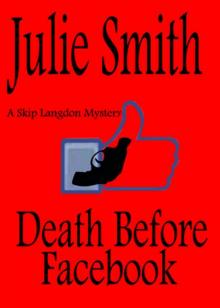 Death Before Facebook (Skip Langdon #4) (Skip Langdon Mystery) (The Skip Langdon Series)
Death Before Facebook (Skip Langdon #4) (Skip Langdon Mystery) (The Skip Langdon Series) P.I. On A Hot Tin Roof
P.I. On A Hot Tin Roof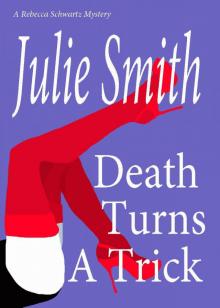 Death Turns A Trick (Rebecca Schwartz #1) (A Rebecca Schwartz Mystery) (The Rebecca Schwartz Series)
Death Turns A Trick (Rebecca Schwartz #1) (A Rebecca Schwartz Mystery) (The Rebecca Schwartz Series) The Axeman's Jazz (Skip Langdon Mystery Series #2) (The Skip Langdon Series)
The Axeman's Jazz (Skip Langdon Mystery Series #2) (The Skip Langdon Series) The Kindness of Strangers (Skip Langdon Mystery #6) (The Skip Langdon Series)
The Kindness of Strangers (Skip Langdon Mystery #6) (The Skip Langdon Series) Louisiana Hotshot
Louisiana Hotshot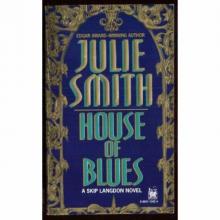 House of Blues
House of Blues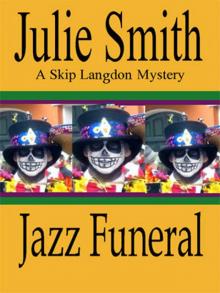 Jazz Funeral (Skip Langdon #3) (Skip Langdon Mystery) (The Skip Langdon Series)
Jazz Funeral (Skip Langdon #3) (Skip Langdon Mystery) (The Skip Langdon Series) Tourist Trap (Rebecca Schwartz #3) (A Rebecca Schwartz Mystery) (The Rebecca Schwartz Series)
Tourist Trap (Rebecca Schwartz #3) (A Rebecca Schwartz Mystery) (The Rebecca Schwartz Series) Louisiana Bigshot
Louisiana Bigshot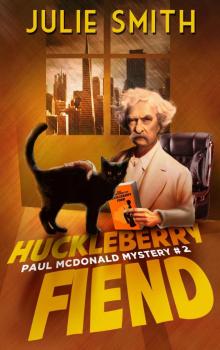 Huckleberry Fiend
Huckleberry Fiend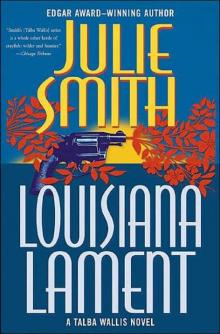 Louisiana Lament
Louisiana Lament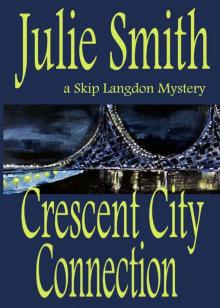 Crescent City Connection (Skip Langdon Mystery #7) (The Skip Langdon Series)
Crescent City Connection (Skip Langdon Mystery #7) (The Skip Langdon Series)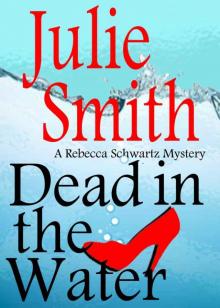 Dead In The Water (Rebecca Schwartz Mystery #4) (The Rebecca Schwartz Series)
Dead In The Water (Rebecca Schwartz Mystery #4) (The Rebecca Schwartz Series)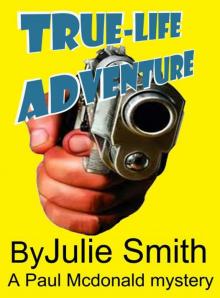 True-Life Adventure
True-Life Adventure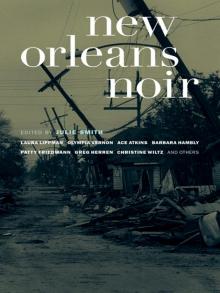 New Orleans Noir
New Orleans Noir